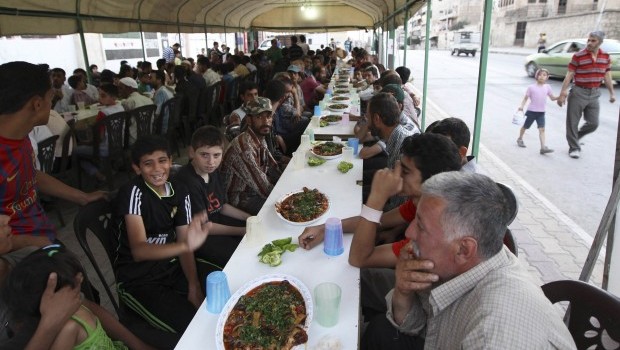
People wait for Iftar (fast-breaking) meal in a Ramadan charity iftar tent in Aleppo on July 16, 2013. (REUTERS/Muzaffar Salman)
In one recent example at the start of the holy month of Ramadan, the city’s new consolidated judicial council issued a decision saying that those who “abandon iftar,” the evening fast-breaking meal, would be imprisoned for a full year. They pointed out that decision is derived from the “unified Arab penal code,” originating from Islamic Shari’a law and issued by the Arab League.
The council, a subsidiary to the Free Syrian Army (FSA), warned in a communiqué of “the severity of skipping iftar without an excuse,” and noted that “the unified Arab penal code, adopted as applicable law, punishes those who violate the sanctity of Ramadan.” The statement excused the “pardoned Mujahideen,” asking them “not to speak out during iftar so they are not accused within their religion.”
The council, made up of 20 members including seven lawyers and three judges, said: “The resolution was issued following the converged efforts of legitimate bodies operating within the rebel brigades with efforts from lawyers supporting the revolution in Syria.”
In the meantime, the new official authority in Aleppo published a fatwa on the social networking site Facebook saying that “unveiled women in tight clothing that outline the body or make-up are prohibited from going out,” urging “all sisters to obey God and adhere to the ethics of Islam.”
The new municipal authority consists of a main executive office that oversees other subordinate branches, including the offices of education, religious advisory and mosques affairs, services, and grain and mills management, as well as the medical and judicial offices.
The central authority oversees the detention of offenders and transfers them to the specific office for punishment. Reportedly, the authority also recently issued a fatwa prohibiting eating croissants, a buttery bread roll, for their “colonial” implications. Copies of the fatwa were published on social networking sites with the official seal of Sheikh Abu Muhammad, a member of the authority.
The statement justifies the ruling by making reference to one of the legends surrounding the origin of the croissant, which means “crescent” in French: that it is shaped in the form of a crescent for Europeans to celebrate their victory over the Muslim Ottoman Empire at the Siege of Vienna in 1683.
Sheikh Abdel Jalil Said, former minister of information in the Syrian Fatwa Council, blames the problems on the lack of competence and knowledge within the new bodies.
He told Asharq Al-Awsat: “The work of such groups should focus on advocacy rather than arresting people and putting them in prison. There is a big difference between a Mufti and a judge and they seek to play the two roles at once.” He stressed that “the Syrian society in general, particularly that of Aleppo, is not used to extremism of any kind. This means that people will triumph in the end with their centrist ideology far from militancy.”
Samir Nashar, member of the opposition Syrian National Council, requested that the Free Syrian Army unify their various divisions in Aleppo to prevent extremist practices spreading, and told Asharq Al-Awsat that there are civilian parties resisting the trend towards religious extremism.
Leadership roles are increasingly being filled by Islamic militant groups in Syria, particularly in areas controlled by the opposition. Their influence is expanding due to Islamic units running police force and administrative councils. Syrians claim these groups are silencing those with different opinions, and even attacking them.
